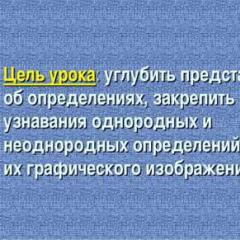Game communication in the senior group “Magic chest of health. Speech games for preschool children Synopsis of the game: I’ll start and you continue
Consultation for parents
Teach children to love books
Akunets Olga Yurievna,
teacher of the highest qualification category
GBDOU kindergarten No. 47
Kirovsky district of St. Petersburg
The computer has entered our daily life. Children school age began to communicate less with each other, their speech experience is limited. The need for verbal communication is not satisfiedT exactly. Spoken speech b troublesnah, taciturn. Children's interest in reading has sharply decreased. Social problems societies do not allow parents to pay enough attention to the comprehensive development of their children.
Therefore, it is necessary to instill a love for books, starting with preschool age.
A preschool child is a kind of “reader”. The word “reader” in relation to preschool age is conditional.
In reality, it is the listener whose encounter with the book is entirely determined by the adult, from the choice of text to read to the duration of interaction with the book. It largely depends on the adult whether the child will become a real, enthusiastic reader or whether a meeting with a book in preschool age will be a random, meaningless episode in his life.
It's hard to overestimate the importance fiction for the development of the child. It helps to broaden one’s horizons, a child’s horizon of knowledge about the world, helps to assimilate patterns of behavior embodied in literary characters, and forms initial ideas about beauty. Only a child accustomed to books has the invaluable gift of easily “entering” into the content of what he hears or read. The baby imagines the stories he read, cries and laughs, imagines what he read so vividly that he feels like a participant in the events. A book read in childhood leaves a stronger impression than a book read in adulthood. The task of an adult is to reveal to the child the extraordinary that a book carries within itself, the pleasure that immersion in reading brings.
A good book is an educator, a teacher, and a friend.
LEARN BY PLAYING!
It is impossible to imagine the world of childhood without a fairy tale. Often in fairy tales there are proverbs and sayings, the meaning of which is not always clear to preschoolers. Proverbs and sayings are treasures of Russian folk speech and folk wisdom. They concentrate and generalize the experience of generations and contain cultural heritage people.
Proverb- a short saying with an instructive meaning.Saying- This is a phrase that aptly defines any life phenomenon. Unlike proverbs, sayings are devoid of instructive meaning and are limited to figurative, often allegorical expression.
The child must not only understand these succinct, apt expressions, but also be able to use them in life. For this purpose, I suggest you play games with your child.
Didactic game “I’ll start, and you continue”
Tasks:
- Teach to understand figurative expressions in proverbs and sayings;
- Learn to actively use them in speech.
ü Strong friendship cannot be spilled with water.
ü Stupid people quarrel, but smart people (agree).
ü Measure seven times - (cut once).
ü Under a lying stone - (water does not flow).
ü What goes around (comes around).
Didactic game "Guess"
Tasks:
- Learn to understand figurative expressions in proverbs, sayings, phraseological units, and actively use them in speech;
- Develop an understanding of such linguistic phenomena as the polysemy of a word.
ü What do they hang when they become despondent? (Hang your nose)
ü Not flowers, but wither when you are ashamed to listen? (Ears droop)
ü Which part of the face does one puff up when offended? (Pout lips)
ü What can you look for in the field but not find? (Look for the wind in the field)
Didactic game “In one word”
Tasks:
- Learn to explain the meaning of proverbs, sayings, phraseological units;
ü Pout your lips. (Be offended)
ü Out of the blue. (Suddenly)
ü It slipped my mind. (Forgot)
ü With all my might. (Fast)
ü Just a stone's throw away. (Near)
HOW TO INTEREST A CHILD IN A BOOK?
A family in which a book accompanies a child from the moment of his birth, a family in which parents read, is a prerequisite for literacy and “feeling” native language. In the absence of a good tradition family reading The child almost never picks up a book himself. He must feel that the life of his parents is unthinkable without reading, then books will enter his life.
Children's books are a reality into which we introduce a child and in which children live seriously. Try to be more careful when choosing a book. Adults should remember that a book attracts a child, first of all, by its design. Its appearance should be not only attractive, but also enticing: different forms of covers, beautiful, bright illustrations. The first books should not be gray and nondescript, with faded and unclear illustrations.
The most important thing in reading for children is not even the reading itself, but the dramatization game that only an adult can organize with a child. To do this, do not try to read your child many different books at once, but try to show how you can talk to a character or, for example, “feed” a dog, “talk” to it, that is, humanize the characters and interest them in them and their actions. Play with your voice: read sometimes faster, sometimes slower, sometimes loudly, sometimes quietly - depending on the content of the text. When reading poems and fairy tales to children, try to convey in your voice the character of the characters, as well as a funny or sad situation.
From early childhood, a child needs to select his own personal library. Go with your child to a bookstore or children's library more often. You also need to remember that your child’s library should have
educational books that make him think, develop his intellect, books different types reflections of reality: not only fairy tales, but also realistic literature, not only prose, but also poetry. This is necessary so that the child from childhood understands the diversity of the world, so that the full range of his feelings develops.
BEFORE BED
Nowadays, unfortunately, parents who read to their children before bed can be found less and less often. It’s much easier to show your child a cartoon and reassure yourself that it’s not simple, but educational and has much more benefits than a book.
How to instill in a child an interest in reading? Very often, a dislike of books is associated with a child’s lack of perseverance. This problem can be solved by choosing the right time to read.
The right time in this case is before bedtime, the baby has already run around, is tired, so he can lie quietly in his crib, you take your favorite book and for the next half hour, the time belongs only to you two...
As for reading before bed, it calms the child in many ways and becomes a good ritual for going to bed. Most children enjoy listening to a story before bed and fall asleep peacefully. Using your voice and intonation, try to set the child in a lyrical mood, pretend drowsiness, yawning.
By the way, scientists have long proven that even entertaining books, which are read in such a calm atmosphere, develop much better, broaden one’s horizons, stimulate thinking and imagination than expensive, newfangled toys and the most popular cartoons.
WHERE THE FISH SLEEPS? GOOD NIGHT
It's dark at night, quiet at night. Pan asked the pan:
Fish, fish, where do you sleep? -Pan! How to get to Zasypani?
The fox trail leads to the hole. -Just! - Panu Pan said, -
The dog's trail leads to the kennel. Head along Dremal
Belkin's trail leads to a hollow. Straight to the turn
Myshkin - to the hole in the floor. With the sign "Yawning".
It’s a pity that in the river, on the water, from “Yawning” without worries
There are no traces of you anywhere. Poison yourself to Slumber,
Only darkness, only silence. Where, curled up by a pine tree,
Fish, fish, where do you sleep? You'll go straight to Dreams,
And from there to Zasypani
Half a minute to go, sir!
Is everything clear?
Even very!
Goodbye!
Good night!
Playing with children
LEARNING BY PLAYING.
It is impossible to imagine the world of childhood without a fairy tale. Often in fairy tales there are proverbs and sayings, the meaning of which is not always clear to preschoolers.
Outstanding teachers K.D. Ushinsky, E.I. Tikheyeva, A.P. Usova, A.M. Leushina and others have repeatedly spoken about the possibilities inherent in folklore as a means speech development preschoolers.
Proverbs and sayings - treasures of Russian folk speech and folk wisdom: they are full of vivid images, often built on original consonances and rhymes. This is a phenomenon not only of language, but also of art, contact with which is very important for children. They concentrate and generalize the experience of generations and contain the cultural heritage of the people. A proverb is a short saying with an edifying meaning; a proverb is an expression, mainly figurative, which, unlike a proverb, does not constitute a complete statement and is not an aphorism. It must be remembered: proverbs are built on an antithesis; most often they have a literal and figurative meaning. Syntactically, they are divided into two parts, and the second part contains a conclusion, a moral, and sometimes an instructive meaning, for example, “Do not recognize a friend in three days - recognize a friend in three years.” The saying does not have a moralizing, instructive meaning, however, it is characterized by metaphor: “Killed two birds with one stone. Seven Fridays a week. Got lost in three pines." The child must not only understand these succinct, apt expressions, but also be able to use them in life. To this end, we invite you to play these games with your child.
Didactic game “I’ll start, and you continue”
Tasks:
· teach to understand figurative words in proverbs and sayings;
· develop interest in the meaning of a word;
· Learn to actively use them in speech.
Strong friendship cannot be spilled with water.
Alone in the field - (not a warrior).
Stupid people quarrel, but smart people (agree).
Under a lying stone - (water does not flow).
Measure seven times - (cut once).
What goes around (comes around).
Didactic game “Guess.”
Tasks:
· learn to understand figurative words in proverbs, sayings, phraseological units, and actively use them in speech;
· develop an understanding of such a linguistic phenomenon as the polysemy of a word.
…..
What do they hang when they become despondent? (Hang your nose.)
Not flowers, but withering? (Ears droop.)
What can you hear in complete silence? (Like a fly flies by.)
What can you drown in when you are sad? (In tears.)
Which part of the face does one puff up when offended? (Pout lips.)
What can you look for in the field? (Look for the wind in the field.)
Didactic game “In one word”.
Tasks:
· learn to explain the meaning of proverbs, sayings, phraseological units;
· introduce the fact that words have meaning; in conversation they must be used in accordance with their meaning;
· develop analytical thinking.
Pout your lips. (Be offended.)
Out of the blue. (Suddenly.)
It slipped my mind. (Forget.)
As if on command. (Amicably.)
With all my might. (Fast.)
Just a stone's throw away. (Close.)
SPEECH GAMES
“Who can name more?”
1. Name all the wooden (iron, plastic, glass, round, rectangular, blue, red, etc.) objects in the room.
2. Name objects that can be rolled (rearranged, moved, etc.)
"Finish the word"
The adult says the beginning of the word, and the child finishes the word:
Telephone
TV
Cart
"I'll start, you continue"
The adult says a sentence, the child repeats the phrase said by the adult and adds his own.
- “This is a scarf,” says the adult
- “This is a scarf. It is knitted from wool,” says the child
- “This is a scarf. It is knitted from wool. The scarf is gray and fluffy” - adult. (etc.)
"Word Game"
The adult names the word, and the child comes up with a word based on the last sound of the previous word: chair - spoon - watermelon - umbrella, etc.
"Words are enemies"
Example: buys - sells
Putting on - lifting - hiding -
Screaming - gives - took away -
Get sick - buys - helped -
Breaking - praises - fell -
Pours - lies - turned on -
Finish the sentence
Choose words that make sense.
“The bear falls asleep in the fall, and in the spring.....”
“The birch tree leaned over from the wind, and then...”
“When people part, they say goodbye, but when they meet...”
“Put two words into one”
Example: coffee brews - coffee maker
Cleans the snow - eats sweets -
Digs the earth - writes fables -
Rubbing floors - walking on the moon -
Cuts vegetables - walks in the snow -
Chops meat - conducts water -
The fire is extinguished -
"Say kindly"
Example: table - table
IR
House, yard, leaf, nose, tail, ship, bridge, tooth
OK, - EK
Day, stump, beast, city, cauldron, brother, leaf
POINTS
Bone, cabinet, rose, branch, vase, mountain, shelf, bench, fork, bag
“Call it in one word”
Example: stone wall - stone
Brick wall - paper napkin -
Sand path - cardboard box -
A woman made of snow - a crown of gold -
Straw hat - glass vase –
"Find extra word. Explain your choice"
Meow – moo – grunt – fly.
Talk – chat – whisper – listen.
Fight – quarrel – swear – make friends.
Water – knock – weed – grow.
"What does it look like"
The white cloud looks like... (cotton wool)
A rainbow looks like….. (yoke)
"Spread the words"
Example: leaf fall - leaves are falling
Ice drift, fisherman, dump truck, waterfall, scooter, lumberjack, chimney sweep, rhinoceros.
“What’s extra?”
Cucumber, beetroot, pepper, tomato, chair, armchair, sofa, cabinet.
“Mine, mine, mine.
An adult shows an object or a picture, the child must correctly say:
This is my pencil
This is my T-shirt
This is my mirror
"Common Word"
Find a common word for two dissimilar objects
Turtle and snail - slow
Table and cabinet -
River and cornflower -
Lock and door -
Water and milk -
Milk and sugar -
"Choose a word"
Warm, soft, spongy….. (bread)
Delicious, sweet, chocolate...
Agile, long, poisonous...
Yellow, fragrant, liquid...
New, modern, big...
"Professions"
Carrying luggage - porter
Inserts glass -…..
Working on a crane - …….
Dancing on stage - .....
Selling ice cream -….
Repairing the watch -…..
"Words are relatives"
Find related (same-root) words.
Example: birch, birch, birch, boletus
Table, tree, forest, frost, snow, sea, etc.
"Selection of adjectives"
Name as many signs as possible for the word - DOG
Big – shaggy – kind – hunting – playful – jumping
"What Happens"
You need to match the adjective with a noun.
GREEN - tomato, house, crocodile, cucumber, ball
COLD -…….
WICKED -……
KIND -……
PINKY -….
Literature:
I.V.I. Skvortsova " Speech therapy games for children 4-6 years old", OLMA MEDIA Group -2008
L.F.Tikhomirova “Development logical thinking children", Development Academy 1996
N.V. Novotvortseva “Development of children’s speech”, Academy of Development 1996
J. “Child in kindergarten» No. 2/2001
“Crises in children” - Tips for overcoming a crisis for 3 years. Crisis 3 years. Crisis stages in children's development. Age crisis. Age-related crises in children's development. Crisis 7 years. Tips for overcoming the 7 year crisis. Crisis. Love, understand, accept. Tips for overcoming the teenage crisis. Adolescence.
“Child development” - Prospective directions for the development of preschool educational institutions for the organization and control of the psychophysical development of preschool children. Functions of psychological support: Organization psychological-pedagogical accompaniment. Activities of the MDOU administration in organizing and monitoring the psychophysical development of preschool children. Requirements for the main structure general education program preschool education.
“Training and Development” - Approaches to solving the problem. Training and development. Zone of proximal development. Learning ability. Ability to learn. Problem. Training. Education. Three points of view. The concept of the zone of proximal development. The essence of the problem. The essence of the problem of the relationship between training and development. Learning is only good when it comes ahead of development.
“Developmental environment in preschool educational institutions” - Institute of Informatization of Education. Creative group No. 2. DOW Council. Social effect. Creative group No. 3. Module "Analysis of the year's results". Development objectives of preschool educational institutions 2007/2010. Project: “Optimization of the educational environment.” Project advice. Resistance is the resistance and resilience of a child’s body to various kinds of negative influences.
“Developmental environment in kindergarten” - Playrooms are equipped with toys, educational games and aids. Bedroom. The teaching room facilitates the implementation of creative ideas and pedagogical discoveries. Meals in our garden are 5 times a day. Music hall. Psychologist's office. The hall is equipped with all necessary equipment and aids. Sports complex.
“Three Year Crisis” - Stubbornness. Negativism. Changes in child development. Manifestation of harmfulness. Crisis of 3 years. Hysterics. The main signs of a crisis. The most acute crisis. Internal contradiction. If the hysteria does start.



